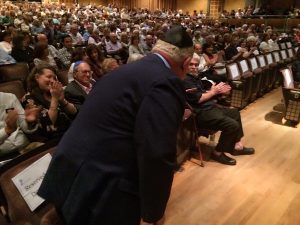There are troublesome contradictions embedded in the traditional format of the wonderful Passover seder. I say this not because I think we need to overhaul or radically change it, but because we need to be acquainted with them so that we might avoid or lessen these pitfalls. The purpose of the seder is to talk about, act out and learn about the process of liberation, of God’s redemptive action. We eat symbolic food, drink four cups of wine, tell complicated stories, utter liturgical blessings, and sing silly songs so that we can fully recognize this one great moment of geulah, of rescue and salvation.
But contradictions can block our full acknowledgment.
READ: THERE’S MORE TO DO TO REACH THE PROMISED LAND
First and foremost, we are obligated to eat matzah, the poor person’s bread – the bread of haste. But have you checked the price of matzah this year or, in fact, of Passover foods in general? This holiday is not a poor person’s holiday. Rather, it belongs to the rich, for only the wealthy can afford these prices.
Matzah prices – especially for shmurah matzah – are in the range of expensive delicacies, rather than symbolic of poor person’s fare. Shopping even for the basics on Passover requires a great deal of time, effort and money. How can we claim this holiday as a national celebration of redemption when it’s not redemptive for all? How can we celebrate the reversal of the matzah from poor bread to one of high cost? Additionally, as the rules play out and accumulate, there is nothing of the haste in the preparation for this holiday. It takes a great deal of time and energy to get ready. For those who work outside of the domestic environment, getting it all accomplished on time is very difficult.
However, this conflict is not inherent in the Passover ritual. We can overcome it. We can work communally to open our doors to the poor and share. We can limit our buying, cut back on the special dishes, limit the menus, be satisfied with less, and be content with simple foods. Those cost-cutting items and sharing acts are within our grasp. I don’t have to make three meats, four side dishes and chocolate pudding cake. But I do have to find a way to make the seder special. And food is one of the ways. Matzah and jam just won’t pass muster. Is this then all about methods and resources?
The next major contradiction engages the prayer/wish “Next year in Jerusalem!” Every year we sing it rather fervently, and every year I wonder who actually means it. Some do, I know. But most of us have absolutely no intent to really go live in Israel. There are a whole bunch of good reasons preventing us from immigrating. Perhaps we mean, “Let’s go visit Israel”? Truthfully, not very many North American Jews actually ever visit Israel. Why not? Perhaps we can pledge to use Israeli products in our homes or use only Israeli wine for the seder and in some way concretize this proclamation, this dedication to Jerusalem – in some way make it real, so that there is no contradiction in your praxis.
READ: MODERN SEDER RAISES MORE THAN FOUR QUESTIONS
But there is a conflict that is inherent in the traditional praxis and is highlighted this year. We tell the story at night. This Passover is a leap year and falls on a Shabbat. So the seder will start very late, after dark. But we pride ourselves on the wonderful way we involve our young children with four questions, lovely songs and special foods. How can we keep them up so late? How can we tell them the story so late? How can we keep their eyes open for those funny goat songs we sing after midnight? This is our painful dilemma. How do we fix this one discrepancy: the needs of our very young and the force of tradition?
We have managed, but the struggle continues to intensify









